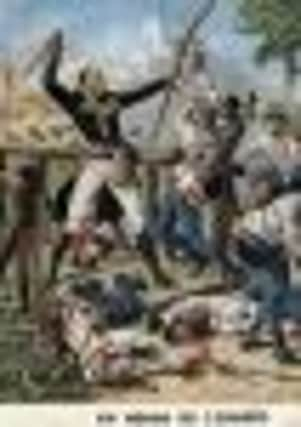Book review: The Black Count, by Tom Reiss


The Black Count: Glory, Revolution, Betrayal, and the Real Count of Monte Cristo
By Tom Reiss
Harvill Secker, 432pp, £20
His story inspired the novel The Count of Monte Cristo, written by his son, Alexandre Dumas, who also drew upon his father’s adventures in The Three Musketeers. Posterity remembers this son as Dumas père, to distinguish him from Alexandre Dumas fils, also a writer, whose novel La Dame aux Camelias was the source for Verdi’s La Traviata. But the general was the first of the three Alexandres (he preferred to be known as Alex), and in The Black Count, Tom Reiss has recovered this fascinating story with a richly imaginative biography.
Advertisement
Hide AdAdvertisement
Hide AdDespite Reiss’ extensive research, the count remains a somewhat remote figure, since his contemporaries usually described him in conventional superlatives. The chief source of information is a highly romanticised memoir by his son, who was not yet four when he died, and who idealised him, in Reiss’ words, as “the purest, noblest man who ever lived”. Still, such language seems deserved. General Dumas was majestically tall (“his proportions were those of a Greek hero”), a crack swordsman and horseman (“looking like a centaur”), utterly fearless, generous to subordinates and a loving husband and father. He was also exceptionally good-looking, though the portraits that survive are less spectacular than the majestic Adonis depicted in the book’s cover illustration.
Dumas was born in 1762 at the western end of Saint-Domingue, the colony that is now Haiti. Remarkably, the French Empire guaranteed protection and opportunities to people of mixed race, and when the boy’s father brought him to France at the age of 14 he received a first-rate education and later joined the army. He never cared much for his feckless father, however, and took the name Dumas from his slave mother, about whom very little is known.
Still a young private in the army, Dumas fell in love and proposed marriage to Marie-Louise Labouret, his landlord’s daughter. It was an enduring love match; years later he wrote to her from the wars, “I am and will always be your best friend”. Her father asked the couple to wait to marry until Dumas was promoted to sergeant. They didn’t have long to wait. The French Revolution had erupted, and he shot up through the ranks.
This was a time of chaos throughout Europe, and Dumas got to experience the upheavals firsthand. Assigned to the Army of the Alps, he fought a series of difficult winter engagements. In addition to being a gifted organiser and inspired tactician, he was indomitable in hand-to-hand combat.
But back in Paris, his civilian superiors kept complaining that he wasn’t accomplishing enough, and when the infamous Committee of Public Safety launched the Reign of Terror, he was charged with defeatism and incivisme, “lack of civic consciousness”. If anyone should have been safe from such an accusation it was Dumas, whose devotion to the principles of the revolution never wavered. But he was su